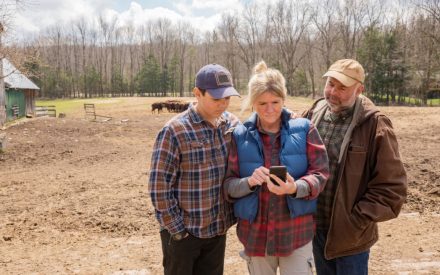This article originally appeared in Wisconsin State Farmer
Have you ever wondered why some people seem to be flourishing while others struggle to achieve their goals? Understanding the formula for success can provide a road map to achieving our purpose which brings us peace of mind and that desired sense of contentedness.
Success is this broad idea of achievement that includes factors such as our passions, priorities, financial desires, lifestyles, relationships, health, and legacy. It is helpful to view it as a continuous journey rather than a final destination.
When I am working with farmers on setting their business strategy, I ask, “What does success look like for you?” and many folks have a tough time answering or knowing how to respond. Taking time to define and figure out what success looks like empowers you to make stronger choices and creates resilience that fuels your motivation and satisfaction.
What creates our formula for success?
Our success begins with a bit of self-reflection. Think through your values, beliefs, and passions. These are the guiding principles that drive us and provide us with that sense of fulfillment. The foundation for our feeling of success or accomplishment.
Next, we align ourselves with our vision and mission which provide the road map for our journey. They tell us where we’re going and how we’re going to get there.
From there we can assess our current business situation. We can do this by completing a SWOT analysis (examining strengths, weaknesses, opportunities, and threats) and inventorying the resources we have available to get a good picture of where we are and what the competitive landscape looks like.
Now that we know where we are and where we’re headed, it’s time to review or set both short and long-term goals for ourselves and the farm business. This will likely involve establishing and monitoring key performance indicators (KPIs) which are quantifiable measures of performance for important activities and products.
Other measures can contribute to our formula for success such as financial metrics, sustainability or environmental impact, technology integration, market dynamics, and relationship management can be integrated into our KPIs and goals.
Another key component is risk management. We need to be able to show how effective we are at identifying and mitigating the risks we face. Risk management measures may need to be created or adjusted along with contingency plans in case of an emergency or uncertainty.
One of the most important (and sometimes forgotten) components of success is monitoring and adjustment. Goals are of little value if there’s no plan for achievement, and no implementation with ongoing monitoring and adjustment opportunities. With a lot of folks, goals don’t get achieved because they’re no longer useful or we’re not addressing the barriers or elephants in the room, and we haven’t gone back and said, “Okay, what’s going wrong? Why isn’t this working? Can we adjust this a little bit,” or maybe we need to set that goal aside and create a new one and move forward.
Are we successful?
Success is contentedness with your decisions and satisfaction with where your farm is or where it’s headed. It’s the ongoing journey towards accomplishment that brings you peace of mind. The better you can shape your formula for success, the easier success will be to achieve.
Success can be hard to define and looks different for every person and every farm business. Taking time to define and figure out your own formula will empower you to measure your performance, spend your time more wisely, and reinforce your sense of satisfaction.



 Identifying strategies to maximize potential and minimize risk
Identifying strategies to maximize potential and minimize risk Establishing Your Values and Purpose – Strategic Thinking for the Farm Business
Establishing Your Values and Purpose – Strategic Thinking for the Farm Business What Motivates You to Succeed – Defining Your Values
What Motivates You to Succeed – Defining Your Values Make Your Strategic Goals A Reality
Make Your Strategic Goals A Reality


